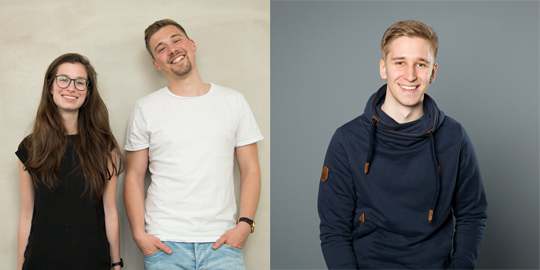Only 40 years of jail time for genocide?
Freiburg, Apr 13, 2017
Is there an appropriate punishment for war crimes and genocide and can it serve justice? Does it make life easier for the victims and those left behind after the perpetrators are behind bars? 15 Freiburg students illuminate the potential and limitations of international criminal law in a cross-medial report.

The seat oft he International Criminal Court for former Yugoslavia in Den Haag: in November 2017 the sentence is expected to be handed down against Bosnian-Serb General Ratko Mladić. Photo: Julian Nitzsche/Wikimedia Commons
International criminal law dictates how war crimes, genocide and crimes against humanity are defined and punished. But is punishment enough for victims to live a peaceful life after the fact? The student editorial staff of uniCROSS located in the media center at the University of Freiburg library posed these questions and attempted to answer them with articles, radio interviews, interactive graphics, videos and photos.
In the report „Völker.Straf.GeRecht“ (International.Criminal.JUSTice), the team summarizes the origins of international criminal law and posed the question to legal professionals, psychologists and laypeople how justice can be brought about for the victims. The focus of the work was the Yugoslavian war in the Balkan states that lasted from 1991 to 2001. To date the exact number of victims is unknown.
In November 2017 the final sentencing for the war-related legal proceedings is expected to be passed down. The defendant is Ratko Mladić, a Bosnian-Serb general who has been accused of numerous war crimes and crimes against humanity.
A long road to sentencing
„We could have selected the Nurnberg trials or the wars in Rwanda or Syria,“ says Sebastian Müller-Runte, the co-director of the project, along with Julia Nestlen and Martin Hübner. „We chose the Yugoslavian wars to show how long war crime trials can take until the courts reach a final decision.“
The topic is a complex one and delving into it was quite difficult, reports Müller-Runte, an English and Biology major at the University of Freiburg. „Because we don’t have any legal professionals in our team, we had to work through the materials ourselves.“ Working with former members oft he International Criminal Court for former Yugoslavia was extremely interesting and informative: „We were very lucky to be able to speak with experts who have dealt with the actual implementation of international criminal law for the past 20 years.“

Julia Nestlen, Sebastian Müller-Runte and Martin Hübner (from left) were the project’s co-directors. Photos: Ilyas Buss
Six months of research
The team’s objective was not just to gather facts and opinions. The students wanted to reach their audience on a human level as well. That is why the interviews with famous actors, but also with other students, were so important: „Our society needs the impetus to want to care for the victims. A legal foundation is not enough. That is why we want for everyone to feel as if the issue concerns all of humanity, including themselves,“ says Müller-Runte.
15 student uniCROSS staff members along with the editors from the student editorial department worked on the report for nearly six months. „Völker.Straf.GeRecht“ is a cross-medial product, meaning staff members from all editorial departments – radio, TV and online, build a single team.
For instance, Müller-Runte is normally a tutor in the radio department uniFM. But he also wrote the texts and compiled the videos for the project. „You learn the most through cross-medial productions. You look beyond your own four walls and sometimes even switch roles. In that way, everyone does what they can while also trying something entirely new.“
Julia Dannehl
Cross-medial report „Völker.Straf.GeRecht“
uniCROSS

